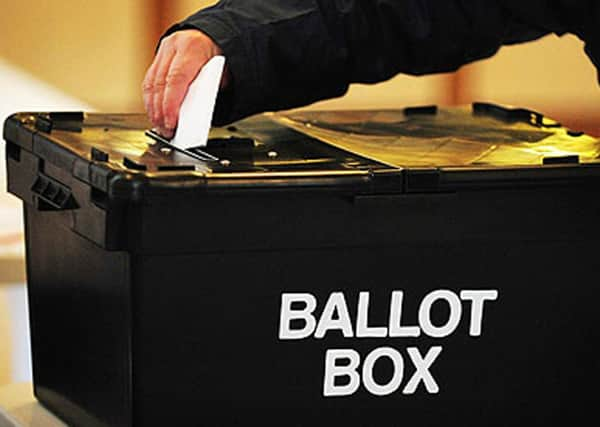Mark Bevan: A positive stand for human rights


The referendum question is disarmingly simple – “Should Scotland be an independent country, Yes or No?” But reaching an answer is complex because I’m driven to ask what difference, if any, would independence make?
I started by thinking about financial security, the field in which there has been the greatest volume of debate, with “facts” used by both sides to support their perspective. But whose facts are right?
Advertisement
Hide AdAdvertisement
Hide AdWe have recently experienced the failure of the world’s leading economists to predict the crash and manage its consequences. I’m unlikely to do better in working out the macro economic benefits of independence. It’s simply too complex an issue to use as a means of judging whether to vote Yes or No, and I suspect I’m not alone.
As a life-long employee of the third sector, I’ve also thought about the choice between a perceived left-of-centre Scotland versus right-of-centre UK in terms of mainstream public attitudes and public policy.
Here I see more confusion – exemplified by Holyrood’s introduction of the right to vote in the referendum for 16 year olds, at the same time that it refused to allow prisoners a vote. At Westminster there is no real doubt that William Hague will use his office to extend protection of rights across the globe whilst Theresa May would appear to be doing everything possible to diminish them on the home front.
So, how to decide ? The decision to vote Yes or No is unlikely to be presented again, its consequences will have ramifications for generations ahead, beyond the lifetime of any voter and perhaps any current political party. When measured over that timescale, most forecasting becomes so inaccurate as to be irrelevant.
I began to think about what kind of country I would like to live in and how I would like its institutions to behave. Considering the question from this big picture. I started with governance and the protection of rights.
People’s rights are not, as some would see them, nice-to-do, lefty, fuzzy things. They are written, with considered thought, enshrined in international treaties, associated protocols and sometimes given effect in domestic law. Statutory instruments provide intent and case law develops. Without the backing of the legislature, be that in Europe, the UK or Scotland the promises, our rights are not enforceable and worthless.
So, what difference would Scottish independence bring? It is not widely appreciated that the Scotland Act (1998), which created the Scottish Parliament, limited the powers of our parliament by writing the Human Rights Act (HRA) into the Scottish Legislature.
In effect the Scottish Parliament must test any new legislation against the standards set by the HRA and may not pass legislation which is contrary. In accepting this, our parliament acknowledges that its powers to legislate are constrained. This is a para-constitutional protection, written into the very Act which created Holyrood, and a good thing.
Advertisement
Hide AdAdvertisement
Hide AdSuch a protection is not afforded to citizens in England, where Westminster can choose to abolish the HRA and can choose to re-negotiate the domestic application of the European Convention on Human Rights. Should we remain in the union then we too would be affected.
“So what?” you may say, a newly independent Scotland could do the same. Independence after all presupposes significant change to the Scotland Act and with it the inherent risk of the HRA being amended. And you’d be right, it could.
But the great prize which independence offers is not whether a bunch of politicians in Holyrood make decisions rather than a bunch of politicians in Westminster. It is that the deal offered, the absolute jewel in the crown of a mature nation is the agreement that should Scotland vote Yes, our legislature, for all time be constrained by a written constitution. That seems to me to be an unequivocally good thing.
A modern constitution can offer very real protection. It is relatively easy at a political level to discount the needs of those on the margins. But a written constitution can protect the most vulnerable from the vagaries of short-term politics. For example in 2010 the German Constitutional Court forced the legislature to think again about a proposal to deliver levels of welfare benefit so low they could be deemed unconstitutional. Article 20.1 of Germany’s Constitution protects, for each person in need of assistance the material prerequisites which are indispensable for his or her physical existence and for a minimum of participation in social, cultural and political life. What’s that got to do with us? Think bedroom tax. Think of people choosing between heating homes and buying food, in Scotland, today.
So, in thinking about the sort of place I would like Scotland to be for future generations I’ve found one argument that seems unambiguous. It’s not about finances, left or right politics or jingoism. It’s about governance, and we’ve all experienced what an absence of that does to those in power.
So I will vote Yes next year, and I support the Third Sector Yes campaign – launching today – because I believe that an independent Scotland will improve the way in which we are governed by presenting an opportunity to enshrine fundamental values, human rights in a written constitution which constrains the legislature for all time. It is not an opportunity to be rejected lightly, for all our sakes.
• Mark Bevan is part of www.thirdsectoryes.org which launches today.